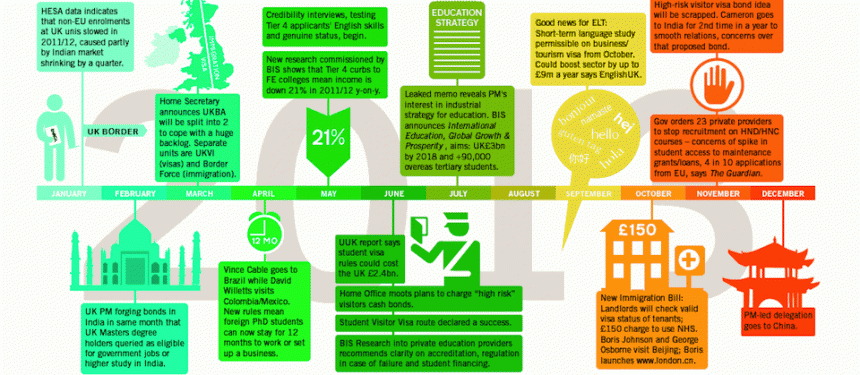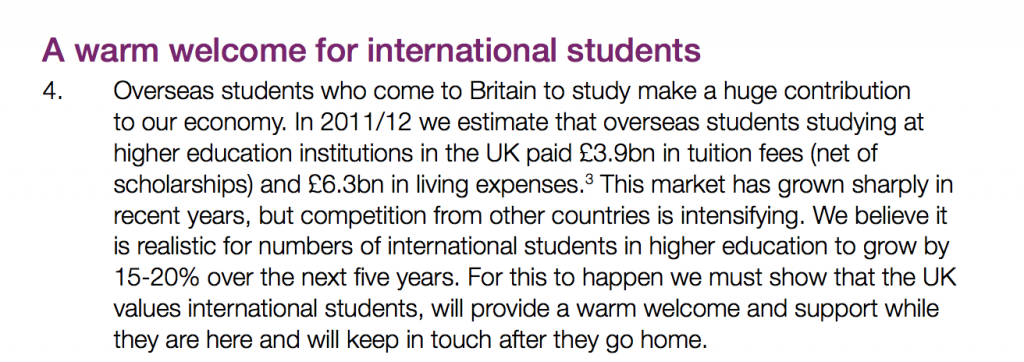The IEC replaces the International Advisory Forum (IEAF) and the UK Trade & Investment’s Sector Advisory Group on Education and Skills (SAGES) with a remit to champion the recommendations of the International Education Strategy: Global Growth and Prosperity that, beyond the contracts target, aims to have 90,000 extra overseas university students by 2018, strengthen education partnerships overseas, expand the Chevening Scholarship programme and encourage more British students to study abroad.
News and business analysis for Professionals in International Education
Have some pie!
What did 2013 mean for international education in the UK?

The council is co-chaired by David Willetts MP, Minister for Universities and Science and the International Education Champion, Sir Eric Thomas. It first met on September 25 and is scheduled to meet 3-4 times a year (the next meeting is February 26).
The IEC draws its members from across the education sector and includes representatives from the British Council, the Association of Colleges (AoC), Technical and Vocational Training UK (TVET), the Higher Education Unit, English UK – full membership can be seen here.
At the council’s first meeting a number of areas, over and above thrashing out the terms of reference, were discussed including TNE, UK outward student mobility, education technology, visa policy, relationships with China and the latest on the proliferation of English Language Training (ELT). The minutes can be seen here.
Existing in part parallel to UKTI Education is HE Global, launched in 2012 and the UK Higher Education International Unit established in 2010.
HE Global is “a mechanism to build collaboration among HEIs, and between the sector and central bodies who aim to support the growth of UK TNE”, moreover they aim to promote “a long-term strategic UK HE offer globally, building on our currently recognised top-table place in international education”.
Rejuvenated by the British Council after BIS and UKTI funding ran out, HE Global has already met with Emily Ashwell and will do so again in the new year. According to Gordon Slaven, HE Global’s Programme Manager, this is “to ensure that we work closely together (as we have already started to do), and ensure that our work is complementary, and not contradictory or duplicative.”
“UKTI Education will identify the big opportunities,” furthers explains Slaven, “and help create appropriate consortia, and address the opportunities. HEGlobal will be building the overall capacity of the sector to be sustainably successful in the TNE arena (including aligning government and other resources to support them), and therefore building the expertise within the sector to address the opportunities identified by UKTI Education.”
“UKTI Education and HEGlobal are in the early stages of development so there is plenty of scope to work together.”
Meanwhile, the UK Higher Education International Unit, representing all UK higher education institutions internationally, works “to support the development and sustainability of the UK higher education sector’s influence and competitiveness in a global environment” through “market intelligence, capacity building, international representation and policy influencing.”
Joanna Newman, director of the IU, has welcomed the establishment of the International Education Strategy and UKTI Education as “indications that the government recognises the importance of international higher education as a vital contributor to the UK economy.”
“We do have a long history of collaborating fruitfully with government partners such as the FCO, BIS, UKTI and with other important agencies such as the British Council, and we expect that will be the case with UKTI Education.”
Still looking? Find by category:




4 Responses to What did 2013 mean for international education in the UK?